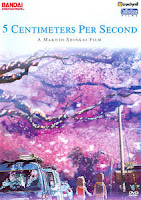 Creator: Makoto Shinkai
Creator: Makoto Shinkai
Translator: Maya Rosewood
U.S. publisher: Vertical
ISBN: 9781941220436
Released: June 2015
Original release: 2008
I was introduced to the work of Makoto Shinkai through his animated film 5 Centimeters per Second, which left a huge impression on me. The beautifully melancholic story about lost and unrequited love was simple enough, but the visuals were stunningly gorgeous. A Sky Longing for Memories: The Art of Makoto Shinkai is an artbook that was originally released in Japan in 2008, the year after 5 Centimeters per Second debuted. I was very pleased when Vertical Comics announced its intention to publish an English-language edition. That volume was ultimately released in 2015 with a translation by Maya Rosewood. Vertical hasn’t released very many artbooks, but A Sky Longing for Memories is a good fit for the publisher. Not only has Vertical published other nonfiction works about Japanese film, it has also released two Shinkai manga: 5 Centimeters per Second and The Garden of Words.
A Sky Longing for Memories primarily consists of stills and background artwork from four of Shinkai’s projects initially released between 2002 and 2007. Prominently featured are three of his animated films—5 Centimeters Per Second, The Place Promised in Our Early Days, and Voices of a Distant Star—as is the television commercial he created for Shinano Mainichi Shimbun, “Say Something Important.” More than half of A Sky Longing for Memories is devoted to 5 Centimeters Per Second, the volume opening with some of Shinkai’s most visually refined and impressive work. The three sections that follow are dedicated to each of the earlier films and “Say Something Important.” Also included in the volume is a glossary—useful for readers who are unfamiliar with some of the technical terms used in the animation industry—as well as “Makoto Shikai’s Colors,” a section exploring the methods and techniques used by Shinkai, and “Testimonials of Makoto Shinkai’s World,” a collection of brief interviews with Shinkai and ten other members of Shinkai Works.
Although A Sky Longing for Memories can simply be appreciated and enjoyed as a collection of stunning artwork, the volume also provides insight into the creative processes and artistic direction required to achieve such impressive images. Many of the individual pieces are accompanied by brief descriptions of the decisions that were made in their overall design in addition to the specific considerations and techniques used in their creation. It’s unclear who actually wrote much of the text in A Sky Longing for Memories, but from the context it would seem to either be one (or several) of Shikai’s staff members or someone else who was close to the work being done. Either way, I was glad for the inclusion of the various descriptions and explanations; I don’t have a strong background in visual art or design and so found A Sky Longing for Memories to be illuminating and intellectually stimulating as well as beautiful to look at.
One of the key components of Shinkai’s style is his use of color. With this in mind, Vertical has taken great care to faithfully reproduce Shinkai’s artwork in A Sky Longing for Memories; the volume uses thick, glossy paper on which the colors in particular are beautifully presented. Simply put, it’s a gorgeous book of gorgeous illustrations. A Sky Longing for Memories reveals Shinkai not only as a talented artist but also as a skilled director. While he solely handled almost every aspect of Voices of a Distant Star except for the film’s music, by the time 5 Centimeters per Second was produced Shinkai was guiding and coordinating the work of an entire staff. Interestingly, most of the team members were traditionally trained artists from outside of the animation industry who had to learn digital techniques and illustration methods on the job. As can be seen from A Sky Longing for Memories, the result of their combined efforts is spectacular.
 MJ: Well, my first read this week was Aki’s
MJ: Well, my first read this week was Aki’s  MICHELLE: First up for me is volume four of
MICHELLE: First up for me is volume four of  MICHELLE: What we’re talking about is
MICHELLE: What we’re talking about is 



